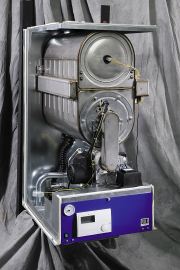Why water treatment is the key to longer boiler life

Modern boilers have a very low water content, making them very vulnerable to accumulated deposits causing boiler failure. The 100 kW version of MHS Boiler’s UltraMax WM range contains just 10.3 litres of water. The benefits, however, include an efficiency in excess of 109.5%, NOx emissions of less than 34 mg/kWh and a matched modulating premix burner with a turndown ratio of 5:1. Up to eight UltraMax WM boilers can be linked using the KKM boiler cascade manager.
PETER GAMMON explains why a programme of water treatment is so important for modern low-water-content boilers.It is the coldest morning of the year. You know it is the coldest morning of the year because the heating is off and the staff are complaining of the cold. You go to your boiler, but instead of the strain of industrious noises it remains silent. And you presume it is a guilty silence.
Inherent design faults This scene will be played out in a host of commercial premises this winter, and the blame for boiler failure will be placed fairly and squarely on the shoulders of the non-operational appliance. But is it inherent design faults or the use of sub-standard components that causes poor performance and premature boiler failure? The most common cause for equipment failure has nothing to do with the design, build and performance of the boiler. The number one reason for appliance breakdown is dirty water. The water that circulates around any heating system will be contaminated with a variety of damaging debris, ranging from limescale to magnetite sludge. Such contamination is always damaging to a heating system, but to the latest generation of high-output, low-water-content appliances, dirty water is a major hazard.
Tolerate Traditional type boilers (such as large-water-capacity cast-iron sectional appliances) can sometimes tolerate considerable fouling for long periods of time before eventually failing through thermal stress. Traditional types generally have larger water content than more modern boiler types, so the amount of debris that is formed in a system has a larger volume within a boiler to be deposited into. Therefore, the amount of deposit may be considerable, but, due to the physical size of the boiler, the debris may be spread fairly thinly, and the heat flux on the sump areas of a boiler is likely to be fairly low in comparison with a modern boiler heat exchanger. Boiler manufacturers constantly strive to raise the efficiency of appliances and reduce size and weight to meet the needs of legislation and cut down on space required within buildings for plant installation.
Water content Generally the size and water content of the system pipes and the heat emitters are more or less the same, regardless of the type of boiler providing the heat source. Therefore, the amount of debris from corrosion of the system will be similar, regardless of boiler type. However, when you consider that a 100 kW traditional boiler type will have a water content of some 50 to 80 litres, but the content of a state-of-the art modern boiler such as the MHS Boilers Ultramax WM 100 kW is 10.3 litres and the heat flux is much higher. It can easily be seen that there is five to eight times less volume to accommodate the same amount of potential deposit. Higher velocities in the waterways of modern boilers generally prevent straightforward sludge deposit, but when the water is hard and likely to form hard scale in the boiler heat exchanger, corrosion debris is bound into the scale, forming a very damaging insulating layer in the boiler. A scale deposit just 1 mm thick in a boiler heat exchanger can cause a thermal drift of 80 to 90°C in the flue-gas temperature, reducing the output of an appliance by some 4% and leading to severe overheating of the material of the heat exchanger.
Vital Modern-type boilers are here to stay, so system designers and installers must come to terms with the fact that system cleansing and water treatment is now very often vital to the wellbeing and longevity of the boiler plant, rather than something that ought to have been done but frequently was not. Some rules should be observed. • Do cleanse systems. • Do treat systems with good-quality corrosion inhibitors. • Do install filters/dirt separators. • Do install adequate flushing points. • Do fill large-capacity systems (in very hard water areas) with softened or demineralised water. • Do protect new boilers from the effects of dirty old systems by separation with a plate heat exchanger. • Do monitor refill water volumes and investigate promptly if water replenishment is excessive. • Do not drain/refill systems unless absolutely necessary. • Do maintain water-treatment concentrations. • Do check and clean system strainers regularly, but most importantly during the first months of operation of new systems or those that have just been worked on.
Filtering As an aid to system cleaning, you may wish to consider the option of mechanical and magnetic filtering. The Diamante double-action filter from MHS has been developed to remove potentially damaging particles from both hot- and chilled-water systems. It is comprised of a very fine stainless-steel mesh strainer capable of stopping debris of 80 µm and over. Inside the mesh is a stainless-steel frame carrying high-gauss magnetic rods. For complete separation of boiler plant from dirty systems, MHS offers a comprehensive range of plate heat exchangers. It is perhaps human nature to blame the component that exhibits the symptoms and not look any further. However, where a scaled boiler is causing problems, remember the boiler is a victim not the villain of the piece. Running a clean and well maintained water condition in a heating system is not expensive and ensures reliable operation from pumps, valves and heat emitters etc. — as well as the boiler.
Peter Gammon is technical products manager with MHS Boilers Ltd, 35 Nobel Square, Burnt Mills Industrial Estate, Basildon, Essex SS13 1LT.
Related links:


